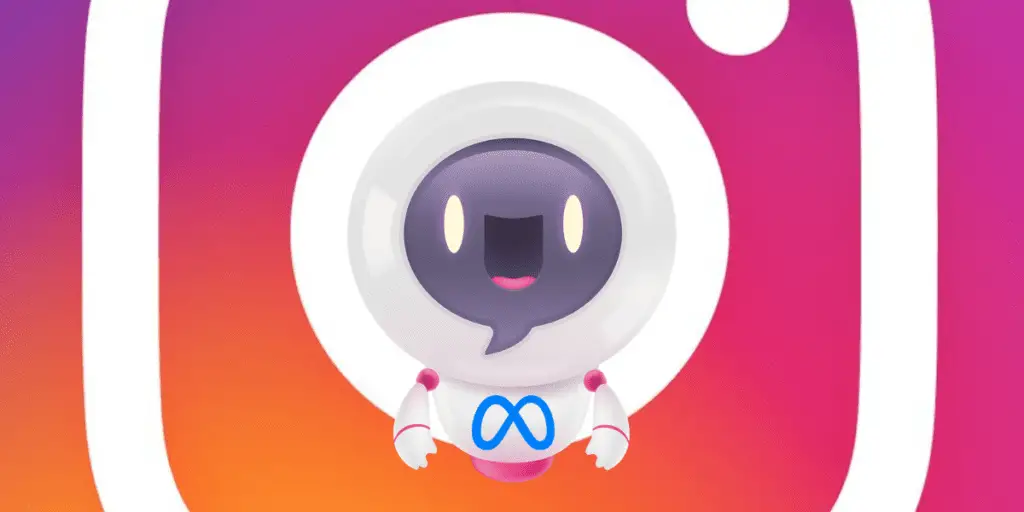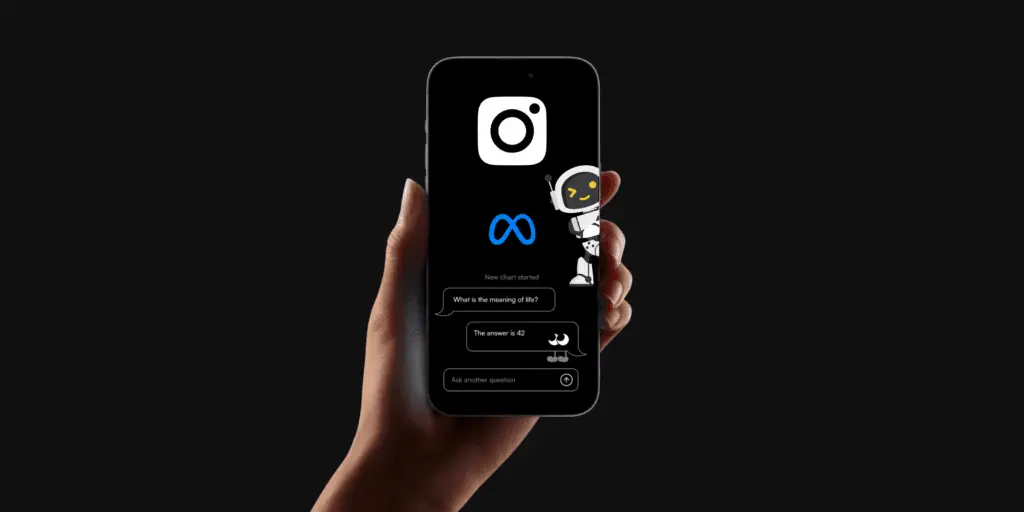Meta, the tech giant formerly known as Facebook, is venturing into new territory with its latest project, Meta AI—a state-of-the-art, AI-powered chatbot now being tested on Instagram.
This cutting-edge feature represents Meta’s ongoing commitment to integrating advanced artificial intelligence across its platforms, enhancing user interactions through various novel capabilities.
Meta AI, first unveiled in September 2023, offers functionalities similar to those found in Microsoft’s Bing Chat. Which includes answering inquiries, crafting poetry, and generating images based on text prompts.
As this innovative technology rolls out in a testing phase on popular platforms, including Instagram, WhatsApp, and Facebook Messenger, users are poised to experience a more interactive and responsive digital environment.
Deployment of Meta AI
Meta AI was first unveiled in September 2023, marking a significant milestone in Meta’s pursuit of integrating artificial intelligence across its suite of social media platforms.
The development of Meta AI is based on Meta’s proprietary Large Language Model, Llama, which has been designed to process and understand vast amounts of text data, enabling it to perform a wide range of tasks, from basic inquiries to complex content generation.
Following its introduction, Meta AI was rapidly integrated into several of Meta’s essential products, demonstrating the company’s strategy to leverage AI to enhance user engagement and platform functionality.
Meta AI enhances conversational capabilities, allowing users to receive instant responses to queries.
In India, Meta AI was added to WhatsApp, allowing users to directly converse on various topics through their main chat list.
The latest testing ground for Meta AI is the app’s search bar and Direct Messaging inbox, where it has been deployed in different areas depending on the user group.

According to a report from Engadget, which cites a Meta spokesperson, Meta AI is currently in various stages of development and public testing.
The company has chosen a limited and controlled roll-out approach, enabling it to gather user feedback and make necessary adjustments before a broader release.
This methodical testing is crucial for refining AI behavior and ensuring the chatbot can handle real-world interactions effectively.
Through these efforts, Meta is advancing its technological capabilities and setting new standards for AI applications in social media, thereby shaping future interactions and engagements on these platforms.
The deployment of Meta AI across Meta’s ecosystem underscores the company’s commitment to innovation and its vision for a more interconnected and intelligent digital experience.
Features of Meta AI
Meta AI brings a suite of advanced functionalities that elevate user interactions across Meta’s platforms. It is designed to perform a diverse range of tasks.
- Users can inquire about various topics, and Meta AI provides accurate and contextual answers.
- The AI can craft creative and engaging poetry based on user prompts, showcasing its versatility.
- Meta AI can generate vivid images with a simple text prompt, making it a tool for creativity and entertainment.
- On Instagram, Meta AI integrates seamlessly into the user experience, enhancing the platform’s interactive capabilities.
Depending on the user group, Meta AI is accessible through the search bar or directly within the Direct Messaging inbox, allowing for easy and immediate interaction.
Users can request Meta AI to generate specific images, such as dogs on skateboards, adding a fun and personalized touch to their engagements.

This AI can suggest Instagram Reels that feature particular content, like cars, helping users discover videos that match their interests. The features of Meta AI are not exclusive to a single platform but are uniformly available across Meta’s different products.
Features like word definition, local news updates, and image generation are consistent whether users are on Instagram, WhatsApp, or Facebook Messenger.
They offer suggested prompts within the chat interface that help users explore its capabilities. These suggestions include tips for managing credit card debt, discussing fitness topics, or sharing travel hacks using points.
These features demonstrate Meta AI’s robust capabilities and potential to significantly enhance user experience. By integrating such a versatile tool across multiple platforms, Meta ensures that users have a consistent and enriching interaction, regardless of the specific Meta product they use.
This strategic consistency improves user satisfaction and streamlines the user experience across different touchpoints within the Meta ecosystem.
User Interaction with Meta AI
Interacting with Meta is designed to be as intuitive and straightforward as chatting with a friend. Users can initiate conversations with the chatbot by simply typing their queries or commands into the search bar or the Direct Messaging feature, depending on where the AI is integrated within the app.
This approach aims to mimic natural human conversation, making the technology accessible and easy for all users.
Meta AI is equipped to handle a wide range of user requests, reflecting its broad capabilities and the diverse needs of its users.
- Users can ask AI to define words, helping them to expand their vocabulary or understand new concepts.
- Users can request local news to stay informed about what’s happening in their area directly through their chat interface.
- Users can spark their creativity by asking Meta AI to create images based on descriptions, such as “dogs on skateboards.”
- The AI can suggest Instagram Reels based on specific interests, such as cars, enhancing content discovery and personalization.
Meta AI offers suggested prompts that appear under the hamburger menu within the chat interface to further engage users and encourage exploration of its features. These prompts are designed to guide users in utilizing the AI’s capabilities and to inspire a variety of interactions.
- Engaging users in “cardio vs. weights” debates can stimulate thoughtful discussions and provide personalized fitness advice.
- Offering tips on managing credit card debt can aid users in making informed financial decisions.
- Sharing travel suggestions using points provides valuable tips for cost-effective travel planning.
Through these interactions, Meta AI enhances the functionality of the platforms it’s integrated with and enriches the user experience by providing practical, fun, and personalized content.
This interaction model is pivotal in fostering a deeper connection between the technology and its users, making Meta AI a valuable companion in their daily digital interactions.
Meta AI on WhatsApp
In a significant expansion of its AI capabilities, Meta introduced the Meta AI chatbot to WhatsApp, one of the most popular instant messaging platforms globally. This rollout began in India, where WhatsApp enjoys widespread usage, making it an ideal testbed for new technology.
The introduction of Meta AI to WhatsApp reflects Meta’s strategy to seamlessly integrate artificial intelligence across its diverse platforms to enhance user engagement and provide a unified experience.
Meta AI on WhatsApp leverages the same large language model, Llama, which powers its functionalities on other meta platforms.
For ease of access, the Meta AI icon is prominently displayed in the main chat list for users in the test phase. This makes the AI as easy to reach as any contact.
Users can engage with Meta AI on various topics by simply sending messages as they would to a friend. This includes everyday queries, information requests, and even more complex discussions.
A key component of Meta’s integration strategy is ensuring that users have a consistent experience, regardless of the device or platform. Features on other platforms, like Instagram and Facebook Messenger, are also available on WhatsApp.
The integration of Meta AI into WhatsApp offers several practical uses and benefits that enhance the user experience.
Users can obtain real-time information, definitions, updates, and answers directly through their messaging platform, particularly useful in regions with varying levels of digital literacy.

By integrating advanced AI, users can translate messages or summarize information quickly and efficiently, making communication more accessible and practical.
Also, Meta AI can offer personalized content and suggestions based on user interactions, which enhances the relevancy and utility of the content it generates or suggests.
As Meta continues to test and refine Meta AI on WhatsApp, the potential for more advanced features and broader rollouts remains significant.
The feedback from these initial tests will likely shape future enhancements, leading to more sophisticated AI interactions and more comprehensive integration across global markets.
This strategic move demonstrates Meta’s commitment to innovation and its foresight in enhancing connectivity and interaction in the digital age, setting new standards for what users can expect from their everyday communication tools.
Implications and Potential Impact
The integration of Meta AI across Meta’s platforms, including Instagram and WhatsApp, is poised to significantly enhance user engagement. By providing instant responses, creative content generation, and personalized recommendations, Meta AI serves to make user interactions more interactive and engaging.
This could lead to increased time spent on these platforms, as users find more value and satisfaction in their enhanced capabilities.
As with any technology that processes large volumes of personal data, the deployment of Meta AI raises privacy and data security concerns.
Users may be wary about how their conversations and data inputs are being used, stored, or shared. Ensuring robust privacy policies and transparent user data handling practices will be critical for Meta to maintain trust and compliance with global data protection regulations.
Meta AI has the potential to positively impact digital literacy by making complex information more accessible through simple conversational interactions.
For users in regions with lower digital literacy, this can be particularly transformative, providing easier access to information and services that were previously out of reach. Additionally, the AI’s capabilities to support multiple languages could further broaden access and reduce language barriers.
Meta AI’s ability to generate creative content such as poetry and images could shift the dynamics of content creation within the social media landscape. This technology may empower users to create more content more easily, potentially leading to a surge in user-generated content.
On the flip side, it could also raise issues concerning the authenticity and originality of content, impacting how content is valued and monetized.
The successful implementation of Meta AI sets a precedent for other tech companies, potentially spurring further innovation and competition in the AI space.
Companies may feel compelled to develop similar or more advanced AI solutions to keep up with user expectations and market demands, thereby accelerating the pace of AI technology development in the social media and communications sectors.
The feedback and data gathered from the current testing phases of Meta AI will likely inform future technological developments.
As Meta continues to refine its AI models based on real-world user interactions, we can expect to see more sophisticated AI functionalities emerging. This could lead to more seamless and intelligent user interfaces, predictive technologies, and possibly even AI-driven virtual reality experiences.
By integrating Meta AI across its platforms, Meta not only enhances the current user experience but also paves the way for future innovations that could redefine how users interact with technology on a daily basis.
Final Thoughts
The testing and gradual implementation of Meta AI across platforms such as Instagram and WhatsApp mark a significant evolution in how users interact with social media and messaging services.
When you leverage the capabilities of its proprietary AI technology. Meta is at the forefront of transforming digital interactions, offering users not only enhanced functionalities like instant information retrieval, creative content generation, and personalized recommendations but also a more engaging and interactive experience.
As Meta continues to refine and expand the reach of Meta AI, the implications for user engagement, privacy, content creation, and the competitive dynamics within the tech industry are profound.

While introducing such advanced AI capabilities brings excitement and convenience. It also prompts meaningful discussions about privacy, data security, and the ethical use of AI in social platforms.
Meta AI’s success will depend not only on technological innovation but also on Meta’s ability to address these challenges and adapt to user feedback and regulatory requirements.
If successfully managed, Meta AI could set new standards for AI integration in social media and beyond, influencing future technological developments and reshaping the digital landscape.
Meta AI represents a bold step towards a more interconnected and intelligent digital future. Its development and deployment are a testament to Meta’s commitment to innovation and vision for enhancing user experiences across its global platform ecosystem.


